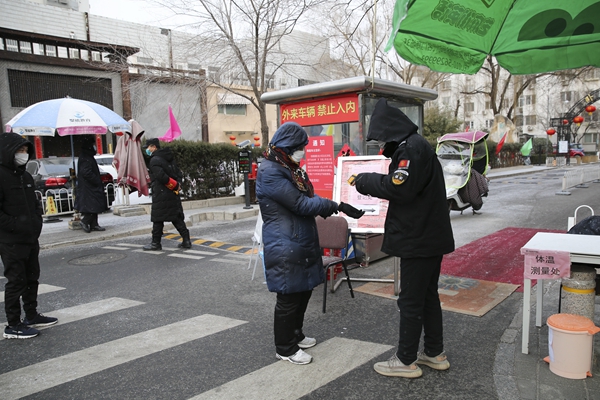Inside accounts of home-based quarantine


The following are personal accounts from two people who are undergoing a two-week quarantine in Beijing. They returned from Hubei province, whose capital, Wuhan, is the epicenter of the coronavirus outbreak, to Beijing before and during Spring Festival.
Zhang Jian (pseudonym)
To be honest, I could never have imagined that our family would spend New Year's Eve on the train back to Beijing.
Two days before Spring Festival, my wife and I took our children back to my hometown in Hubei province to spend the holiday with our parents. But the development of the epidemic made us come back to Beijing earlier than we planned. We canceled New Year's Eve dinner, and left without visiting friends and relatives.
On the train journey back, passengers covered their faces with masks. Sitting in the carriage and watching the changing view outside the window, my heart was filled with worry and anxiety.
When we exited the train station, our temperature was taken and on the subway station, the smell of disinfectant fluid was floating in the air. Each carriage had been disinfected with the date that it had been done clearly displayed. Although I couldn't see people's faces clearly, everything was in order and there was no sign of panic.
We received a long text from the Beijing Center for Diseases Control and Prevention with detailed instructions to carry out self-protection.
After I returned home to Yizhuang, Daxing district in Beijing, I immediately reported to the property management staff and the neighborhood committee about where we had been. Since we originally planned to stay in Hubei for a few more days for the holiday, we didn't save much food in our flat. This could be a problem, I realized, during the two-week quarantine.
On the fourth day of the Chinese lunar New Year (Jan 28), when the neighborhood committee called to check on our temperature, I asked if they could help buy some food. The committee members wrote down our requests, and delivered food to our door in just a few hours.
Although we never stepped outside, our everyday life went on smoothly inside.
It has now become a regular activity to speak with the neighborhood committee on the phone, and every day, we are assured that we can contact them anytime should we need anything.
Li Nian (pseudonym)
You never notice how time flies, it's already the sixth day of the Chinese New Year (Jan 30), and the fifth day since my family and I returned to Beijing from Hubei.
When we were staying in Hubei province for a family reunion to celebrate the Chinese New Year, we learned that people who returned to Beijing from Hubei needed to stay at home for close observation of body temperature for two weeks. Wishing to attend work as early as possible, we drove back and got home at 9 am on Jan 26.
The neighborhood is doing a thorough job of preventing the disease. There are security guards disinfecting passing cars, guiding people coming from outside to register and undergo a temperature check. Tips about how to prevent the disease are posted on the bulletin boards and the door of the apartment buildings, with the contact number of the neighborhood committee written on them.
We reported our trip to the property management staff and the neighborhood committee right after we put down our luggage, and started self-isolation.
At home we always watch the latest news of the epidemic, worrying about loved ones in Hubei. We have also been receiving good wishes from many people.
The staff asked if we needed anything, and the next day, they went to the supermarket early in the morning and purchased much-needed sterilization supplies to deliver to our door.
Everyday, we leave the trash on the doorstep waiting to be disinfected and thrown away by property managers, and friends who live in different areas frequently bring food for us.
We talk to friends and relatives on the phone. With books at hand, we relax by watching television together.
The weather has been nice these past few days. I believe that as long as people are fighting the disease together, it will soon be overcome.




































